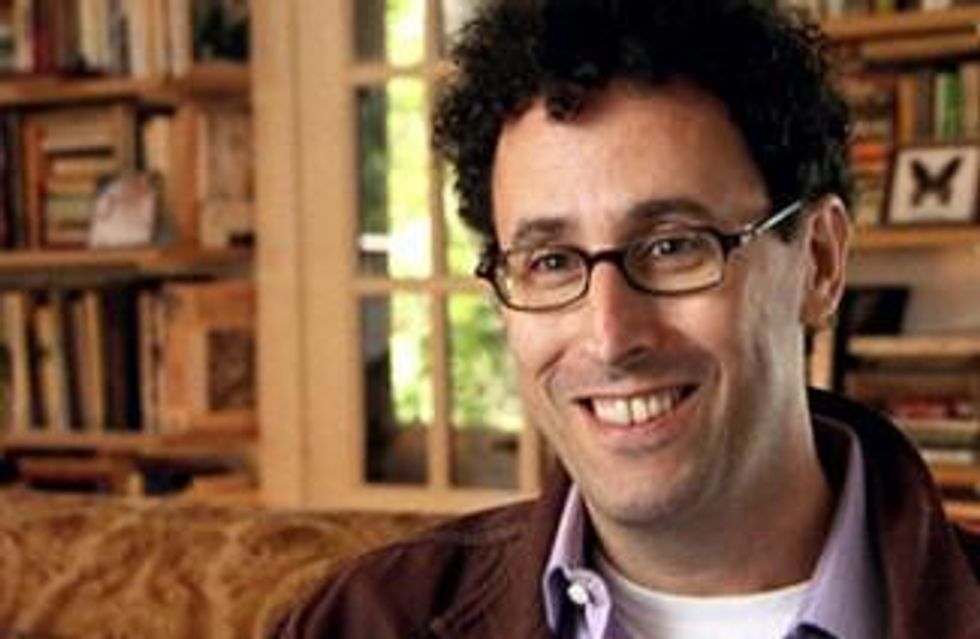Tony Kushner Denied Honors Over Palestine
This week, the news hit that Pulitzer Prize-winning playwright Tony Kushner, perhaps best known for his Angels in America, was being blocked from receiving an honorary degree from the City University of New York because of his views on Israel.

Kushner, who also has an honorary degree from Brandeis University, told Salon's Justin Elliott that this was an "unprecedented and pretty ugly experience."
Sadly, though, it's not that rare for academia to balk at support for Palestinians. Elliott notes that just this January, a Brooklyn College adjunct professor was fired--and later reinstated--after students and an assemblyman complained about his views. Last summer, GRITtv guest and fellow Brooklyn College professor Moustafa Bayoumi was the center of a controversy around his book, How Does it Feel to Be A Problem? Being Young and Arab in America. And back in 2009, Joel Kovel visited us at GRITtv to discuss his termination from Bard College, which he believed was over his pro-Palestinian views.
It's notable that the same cast of characters turns up again and again in these stories. Bruce Kesler, a Brooklyn College alum, caused a stir in both Brooklyn College cases, and Jeffrey Wiesenfeld is the CUNY board member who blocked Kushner's honor.
Wiesenfeld is, Elliott notes, a trustee at the pro-Israel think tank the Washington Institute for Near East Policy, and an organizer of the Salute to Israel Day Parade Committee. His views are clearly not considered controversial or problematic.
Instead, even a famed Jewish playwright like Kushner, who reiterated in his letter to the CUNY trustees that he supports the continued existence of Israel even as he opposes the state's policies, is accused of being an extremist.
At a time when dancing in the streets is accepted as a proper response to the killing of Osama bin Laden, it's ironic to see that support for human rights--in this case in Palestine--is still controversial.
An Urgent Message From Our Co-Founder
Dear Common Dreams reader, The U.S. is on a fast track to authoritarianism like nothing I've ever seen. Meanwhile, corporate news outlets are utterly capitulating to Trump, twisting their coverage to avoid drawing his ire while lining up to stuff cash in his pockets. That's why I believe that Common Dreams is doing the best and most consequential reporting that we've ever done. Our small but mighty team is a progressive reporting powerhouse, covering the news every day that the corporate media never will. Our mission has always been simple: To inform. To inspire. And to ignite change for the common good. Now here's the key piece that I want all our readers to understand: None of this would be possible without your financial support. That's not just some fundraising cliche. It's the absolute and literal truth. We don't accept corporate advertising and never will. We don't have a paywall because we don't think people should be blocked from critical news based on their ability to pay. Everything we do is funded by the donations of readers like you. Will you donate now to help power the nonprofit, independent reporting of Common Dreams? Thank you for being a vital member of our community. Together, we can keep independent journalism alive when it’s needed most. - Craig Brown, Co-founder |
This week, the news hit that Pulitzer Prize-winning playwright Tony Kushner, perhaps best known for his Angels in America, was being blocked from receiving an honorary degree from the City University of New York because of his views on Israel.

Kushner, who also has an honorary degree from Brandeis University, told Salon's Justin Elliott that this was an "unprecedented and pretty ugly experience."
Sadly, though, it's not that rare for academia to balk at support for Palestinians. Elliott notes that just this January, a Brooklyn College adjunct professor was fired--and later reinstated--after students and an assemblyman complained about his views. Last summer, GRITtv guest and fellow Brooklyn College professor Moustafa Bayoumi was the center of a controversy around his book, How Does it Feel to Be A Problem? Being Young and Arab in America. And back in 2009, Joel Kovel visited us at GRITtv to discuss his termination from Bard College, which he believed was over his pro-Palestinian views.
It's notable that the same cast of characters turns up again and again in these stories. Bruce Kesler, a Brooklyn College alum, caused a stir in both Brooklyn College cases, and Jeffrey Wiesenfeld is the CUNY board member who blocked Kushner's honor.
Wiesenfeld is, Elliott notes, a trustee at the pro-Israel think tank the Washington Institute for Near East Policy, and an organizer of the Salute to Israel Day Parade Committee. His views are clearly not considered controversial or problematic.
Instead, even a famed Jewish playwright like Kushner, who reiterated in his letter to the CUNY trustees that he supports the continued existence of Israel even as he opposes the state's policies, is accused of being an extremist.
At a time when dancing in the streets is accepted as a proper response to the killing of Osama bin Laden, it's ironic to see that support for human rights--in this case in Palestine--is still controversial.
This week, the news hit that Pulitzer Prize-winning playwright Tony Kushner, perhaps best known for his Angels in America, was being blocked from receiving an honorary degree from the City University of New York because of his views on Israel.

Kushner, who also has an honorary degree from Brandeis University, told Salon's Justin Elliott that this was an "unprecedented and pretty ugly experience."
Sadly, though, it's not that rare for academia to balk at support for Palestinians. Elliott notes that just this January, a Brooklyn College adjunct professor was fired--and later reinstated--after students and an assemblyman complained about his views. Last summer, GRITtv guest and fellow Brooklyn College professor Moustafa Bayoumi was the center of a controversy around his book, How Does it Feel to Be A Problem? Being Young and Arab in America. And back in 2009, Joel Kovel visited us at GRITtv to discuss his termination from Bard College, which he believed was over his pro-Palestinian views.
It's notable that the same cast of characters turns up again and again in these stories. Bruce Kesler, a Brooklyn College alum, caused a stir in both Brooklyn College cases, and Jeffrey Wiesenfeld is the CUNY board member who blocked Kushner's honor.
Wiesenfeld is, Elliott notes, a trustee at the pro-Israel think tank the Washington Institute for Near East Policy, and an organizer of the Salute to Israel Day Parade Committee. His views are clearly not considered controversial or problematic.
Instead, even a famed Jewish playwright like Kushner, who reiterated in his letter to the CUNY trustees that he supports the continued existence of Israel even as he opposes the state's policies, is accused of being an extremist.
At a time when dancing in the streets is accepted as a proper response to the killing of Osama bin Laden, it's ironic to see that support for human rights--in this case in Palestine--is still controversial.

